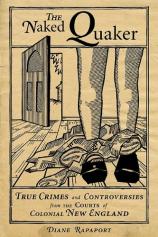Reading Group Guide
Discussion Questions
The Naked Quaker: True Crimes and Controversies from the Courts of Colonial New England

1. Did you learn anything new or unexpected from The Naked Quaker about Puritans and life in colonial New England? Do you see aspects of Puritan values that carry over into modern American life?
2. Do you agree with Rapaport’s observation that “human nature was not so different three hundred fifty years ago” [p. 34]? What do the stories in The Naked Quaker tell you about human nature?
3. Why did Lydia Wardell (the “naked Quaker”) choose nudity to call attention to her grievances? Do you think she achieved her goals? Can you imagine circumstances where you would take similar dramatic action to express your views?
4. In the chapter “Witches and Wild Women,” and throughout the book, we meet colonial women of varying ages and social classes. Did these women share similar traits? How would you judge their behavior by today’s standards? Why did “outspoken unmarried women” [p. 1] face so much community suspicion and disapproval in Puritan times?
5. The witchcraft hysteria in 17th-century New England (most notably at Salem Village, Massachusetts) continues to fascinate us today. Why? Although we no longer accuse people of being witches, do you see any parallels in our modern world?
6. Rapaport says, in chapter 10 [p. 117]: “If I could travel back in time somehow to meet just one person in colonial New England, I would choose Thomas Danforth.” Which of the people profiled in The Naked Quaker would you most like to meet? Why? What questions would you ask him or her?
7. What does Rapaport mean when she says: “the distinction between slave and servant was often blurred, especially in the 1600s” [p. 51]? What can we learn from The Naked Quaker about servitude and social mobility in 17th-century New England?
8. What role did law and courts play in the daily life of colonial New Englanders? How does the 21st-century legal system affect you? Do you see similarities and differences? Why do you think we enjoy watching Court TV and reading accounts of trials and crime?
9. Several stories in The Naked Quaker involve the legal consequences of words --- insulting, slanderous, angry --- spoken to or about other people. Did the spoken word have more significance for people in colonial New England than for us today? Why or why not?
10. Discuss the author’s use of language and writing style. Does her focus on separate narrative stories make history more accessible to modern readers? Do you see advantages and drawbacks to presenting history in this way?
11. Does this book make you curious about the lives of your own ancestors? Do you have stories to share from your heritage?
The Naked Quaker: True Crimes and Controversies from the Courts of Colonial New England
- Publication Date: October 1, 2007
- Hardcover: 160 pages
- Publisher: Commonwealth Editions
- ISBN-10: 1933212578
- ISBN-13: 9781933212579






